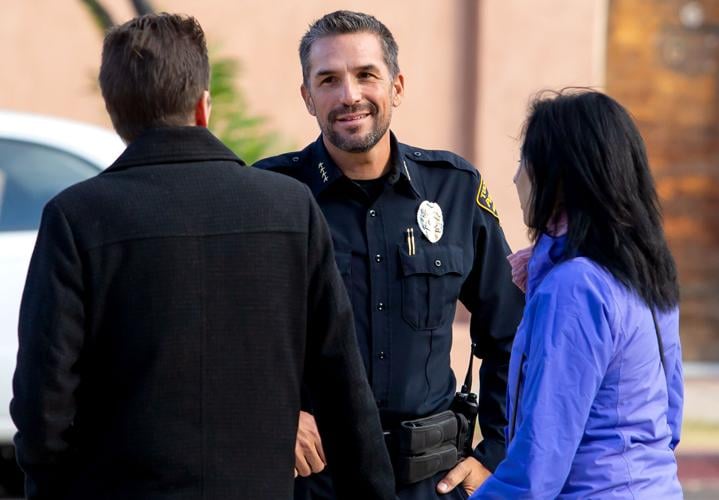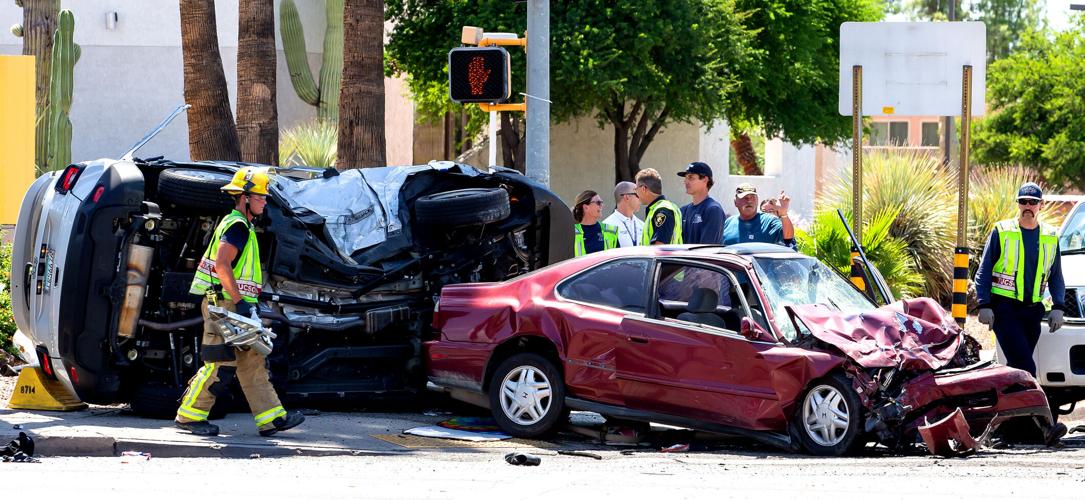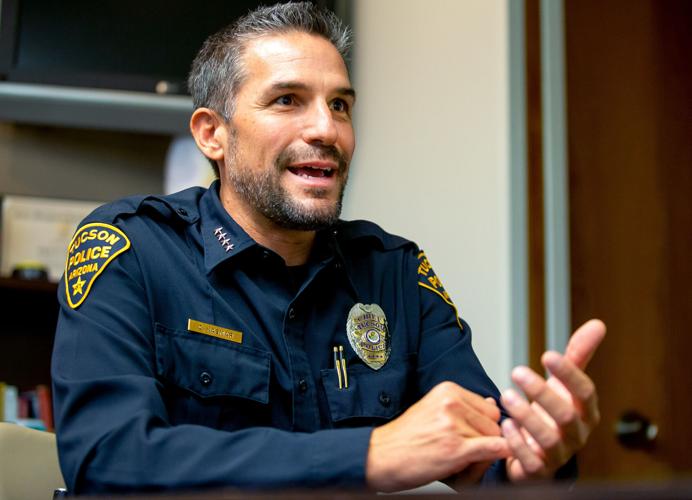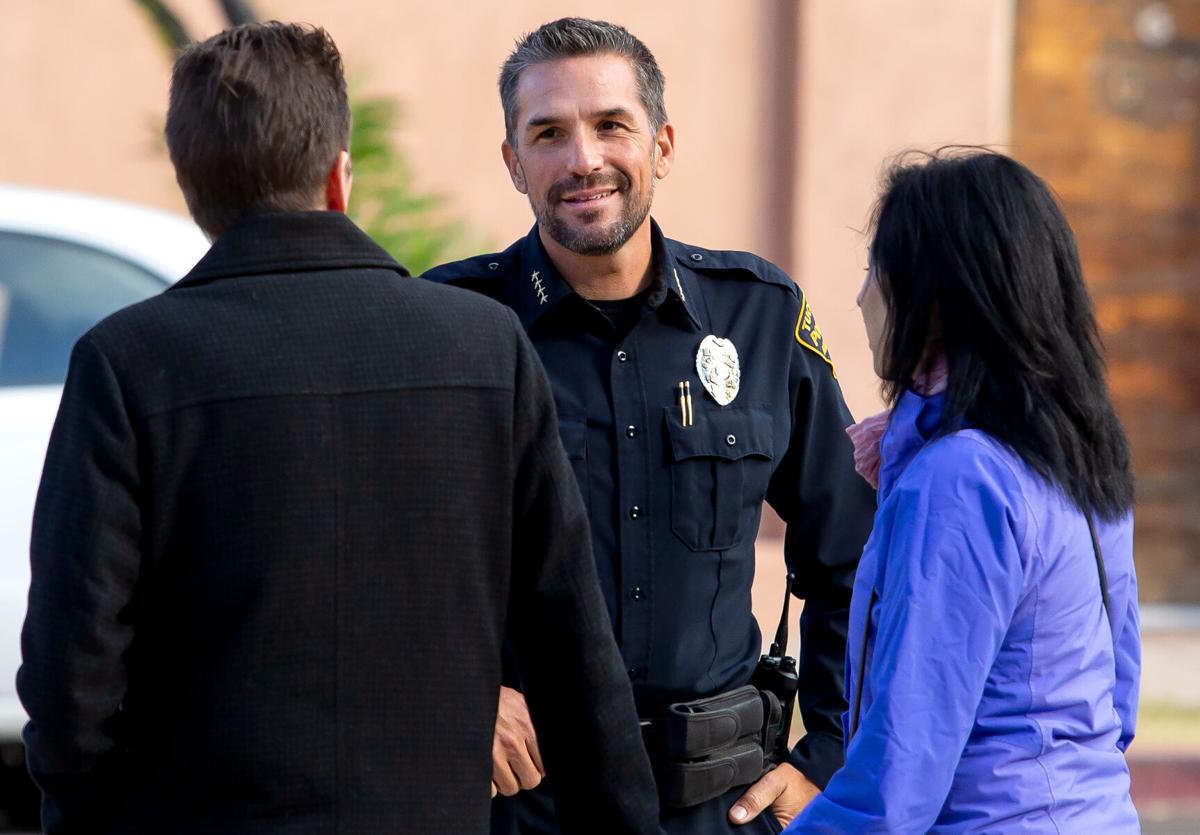On the second day of his new job as Tucson police chief, Chad Kasmar found himself in a full-circle experience, returning to his patrol roots to make a good old-fashioned traffic stop.
The 44-year old Tucson native has worked all over the Police Department during his 21 years there but says that as a former motor officer, he still has a passion for traffic safety. He pulled over a driver he says was doing double the speed limit in a school zone with a crossing guard standing by.
Traffic safety is high on Kasmar's list of priorities for the department and for keeping the community safe during 2022.
He said the Tucson Police Department will focus on violent crimes in the new year but will also step up traffic enforcement, which previous chief Chris Magnus let up on because of a shortage of officers. Tucson police issued fewer than half as many traffic tickets this year than they did in 2018.
Rising vehicle fatality rates almost match the city's record-high homicide rate for 2021. As of Dec. 20, Tucson had recorded 83 traffic fatalities and 94 homicides this year.
"We are not going to tolerate another year of 80-plus fatalities in our community," Kasmar told the Arizona Daily Star in an interview.
"You have more odds of being a victim from a vehicular accident, whether you're driving or you're a pedestrian or you're on a bicycle, than you do of being the victim of a violent crime."
There are other complicated issues he says TPD is working hard to address along with other stakeholders, including homicides, unhoused and unsheltered individuals, and substance misuse.
Kasmar has several priorities as he takes the helm. But he says one of the first things he will do is listen to residents through a series of conversations to gauge what's working for police and the community and what is not.
Decades with
the department
Kasmar grew up in Tucson and is a graduate of Amphitheater High School and the University of Arizona. He began working at TPD in 2000 and spent his seven years as an officer on assignments including patrol in the midtown division, bicycle patrol, solo motor patrol in operations division south, and on a hostage crisis team.
He was promoted to sergeant in 2007 and lieutenant in 2011, taking command of TPD's Office of Internal Affairs and and Operations Division West. He worked as a captain from 2014 through 2016, serving as chief of staff to then Chief Roberto Villaseñor, and as patrol division captain for Operations Division East.
When Magnus was hired as TPD's chief in January 2016, he promoted Kasmar to chief deputy, a position he held until January 2021, when he was tapped by City Manager Mike Ortega to serve as interim director of the Public Safety Communications Department.
There, Kasmar led the charge to consolidate fire and police operations within the 911 center, restructured the department and leadership team, and increased staffing levels. He said the experience gave him a fresh perspective.
"TPD is a big machine. And we don't always recognize how our organizational structure and actions impact other departments," Kasmar said. "It gave me an opportunity to see that and work with other departments."
Kasmar said that as he returns to the place he considers home, he has a lot of immediate ideas for the department. But before he solidifies his vision, he said he needs to take some time to listen.
"We'll be having community conversations in all the different wards with all the different council members," Kasmar said. "I'll be meeting with a lot of the community groups that we already have relationships with, and certainly new ones that reach out to me. If I don't have a relationship with you or if you've never had a chance to speak or work out with me, reach out and let's talk about where we want Tucson to be in 2022."
Every problem TPD deals with is not just a police department problem, he said, including the rising homicide and traffic fatality rates and quality of life issues such as homelessness and substance use.
"All of these are complicated issues that take a lot of stakeholders to impact," he said. "The skill that I have as a Tucsonan and a homegrown Tucson police officer is that I have a great understanding of how our department works. I have also worked in every geographic area in the city, and they're all very different."
Kasmar said he realizes his job also entails making decisions that will not always be popular, and that he is ready to take on that challenge.

Traffic safety is high on Police Chief Chad Kasmar's list of priorities for the department and for keeping the community safe during 2022.
Officer staffing
and wellness
Staffing — both retention and recruiting — is another priority.
"We are not attriting 10 officers a month (in 2022.) That's not happening," Kasmar said, adding that TPD's attrition rate for 2021 was about 35% higher than previous years, with just more than eight officers a month leaving the force.
TPD is bringing in a company to assist with recruiting strategy, but Kasmar said the police department's employees should be its best recruiters.
"If we are taking care of our staff, and they understand what the vision is and what direction we're going, they understand they're going to be treated fairly, and well-equipped and well trained to do their job," he said. "Happy, healthy employees deliver the best service possible to our community."
Over the past 90 days, TPD has been working on a program to address mental health and wellness in its employees. Lt. Dominic Flores was assigned to the department's wellness division in October, with Magnus giving him the latitude to build his own program.
In May 2020, TPD started its Active Bystander in Law Enforcement program, which emphasizes that department members be accountable and responsible to each other when it comes to checking in if something seems off.
"It's our responsibility to reach out to each other to try to figure out what's going on and try to intervene," Flores said.
The voluntary 10-hour training is open to all department staff, and 250 employees have been trained. Flores hopes all patrol officers will be trained by March.
"The future of policing is … you can't have a bad day in policing anymore," Kasmar said. "We take individuals who are often in their early 20's. We give them nine months of training, and we give them this massive responsibility with a gun and a badge, and a lot of tools on their tool belt and a body-worn camera, and we tell them, 'Go forth and learn how to be a police officer.'"
Kasmar said it can take three to five years for an officer to become well-rounded, but that time is a luxury the department doesn't have. Being trained on complicated issues such as how to respond to a domestic violence situation or give a death notification is very different than going out and doing it.
"As you experience some of those things and see some of the worst aspects of life, trauma-informed care and making sure we're taking care of our staff is so important," Kasmar said. "But it's not enough resources for a department this size. I'm really proud of the training the department's rolled out the last year, but it's not enough."
Going forward, there will be more of a departmentwide focus on checking in with one another on a base level, he said. The first five or 10 minutes of a patrol briefing will be a temperature check to see where everyone's at.
"The reality is, these are human beings who have sick children, who have aging parents, who have just suffered a loss, who are still trying to process a child dying in their arms the shift before," Kasmar said. "These are all things that if we don't create an environment where we can talk about it, where we can offload those feelings and support each other, we're going to have outcomes in the field we don't want and officers leaving the profession much sooner than they should."
TPD is the first department in the state to roll out Active Bystander in Law Enforcement training, and it's about to become the first in the region to offer a post-traumatic growth program to its employees, through a partnership with a facility in Sonoita called the Boulder Crest Foundation.
In November, the first group of 20 TPD employees underwent the five-day program. Flores said he has received feedback that the program was transformative in the attendees' personal and professional lives.
Another class is scheduled for January, and Flores is eyeing two more in the spring, bringing the total number of trained "wellness practitioners" up to 80.
"This ties into a preventative angle, too. We're doing these temperature checks and making sure that everyone is in the right space to do a really dynamic, critical job," Kasmar said. "That has the opportunity to prevent some of the bad outcomes that we've seen."

Tucson Police Chief Chad Kasmar, 44, is a 21-year veteran of TPD. "I bypassed a lot of opportunities that I was courted for (outside of TPD) because if there was a place that I was going to be a police officer, it was going to be under this patch, with this badge," Kasmar said.
Assistance from
the community
With the department down 120 officers and 70 professional staff members, even with enhanced recruiting efforts in place, it's going to take time to reach staffing goals.
The community can help out in a few ways, and Kasmar has created a list of New Year's resolutions for Tucsonans.
"Do not leave your personal belongings in your car, visible, including firearms," he said. "Make sure those are in your house secured."
With pandemic-related tensions and short fuses, keeping one's cool is another big way to help TPD and the community.
"Don't get involved with a verbal altercation with someone else, whether it's a family member or a stranger, whether you're at home or at a gas station," Kasmar said. "Too many violent acts occurred this year, with over 400 shootings. Don't put yourself in a position to be a victim."
He is also asking people to put their phones in the glove box and focus on the road when driving.
As traffic enforcement steps up, "Folks who are doing 20 and 30 over, aggressive driving, reckless driving, distracted driving, those are all the areas we'll be focusing on in 2022, and I'll be out there with them," Kasmar said.
As a cyclist himself, Kasmar said he takes traffic safety personally.
In 2018, TPD officers enforced 63,868 traffic violations, according to TPD's data dashboard. In 2019, that number dropped to 63,569 and in 2020, officers enforced 43,824 violations.
In 2021, enforcement numbers have dropped to 29,301 as of Dec. 20, with decreased staffing and increased call volume both playing a role in the decrease.
"Right now, I'm going to be challenged just to get staff to have the time to deal with hazardous traffic behavior issues. They can and will make time to do that, and ultimately that creates a safer environment for the patrol officers on the street," Kasmar said.
"But we have to be cognizant that if we pull someone over, and it's a person of color, how are they going to feel?" he added. "We have to be thoughtful in the way that we do our jobs."
The same is true if someone is struggling financially and has an expired registration or cracked windshield — that ticket could push them over the edge. Those are conversations the department will be having, he said.
'Faith' showed
in department
Kasmar said he's looking forward to collaborating with city leaders and other stakeholders to make Tucson a safer place.
Rather than conduct a national search, the Tucson City Council unanimously confirmed his appointment as chief on Dec. 7, the very day Magnus became chief of U.S. Customs and Border Protection.
He said that unanimous council decision took courage in light of some high-profile use-of-force incidents at the end of Magnus' tenure.
"That vote shows faith in the department," Kasmar said. "It showed their confidence in me, the leadership team and their confidence in the department."
Kasmar said he is not looking for cheerleaders or unwavering support from the mayor and council, but rather a fair opportunity to provide community services.
"My success has been because I invest in people and they invest back in me," he said. "I'm not up for drawing a line in the sand. I haven't been married and with my wife for 25 years because it's easy or there's not some give and take and understanding and being influenced by someone else's position."
"I'm so confident in our ability as a team that I'm willing to retire if we can't do what we say we can produce, which is, be a meaningful partner and have a positive impact in the community on the issues we face," he said.
"I bypassed a lot of opportunities that I was courted for (outside of TPD) because if there was a place that I was going to be a police officer, it was going to be under this patch, with this badge," Kasmar said.
"TPD is far from perfect. We're humans, we're fallible, but we're always working to be better tomorrow than we are today."







